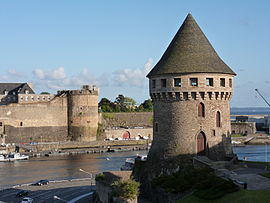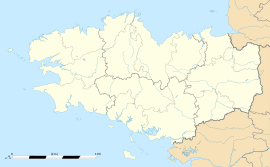
Back Brest Afrikaans Brest (Finistère) ALS Brest (Bretanya) AN بريست (فرنسا) Arabic بريست (بلديه فى فرنسا) ARZ Brest AST Brest (Fransa) Azerbaijani برست AZB Брэст (Францыя) Byelorussian Брэст BE-X-OLD
Brest | |
|---|---|
Subprefecture and commune | |
 A view of the Tour Tanguy with the Château de Brest in the background | |
| Coordinates: 48°23′N 4°29′W / 48.39°N 4.49°W | |
| Country | France |
| Region | Brittany |
| Department | Finistère |
| Arrondissement | Brest |
| Canton | Brest-1, 2, 3, 4 and 5 |
| Intercommunality | Brest Métropole |
| Government | |
| • Mayor (2020–2026) | François Cuillandre[1] (PS) |
| Area 1 | 49.51 km2 (19.12 sq mi) |
| Population (2021)[2] | 139,619 |
| • Density | 2,800/km2 (7,300/sq mi) |
| Demonym(s) | Brestois (masculine) Brestoise (feminine) |
| Time zone | UTC+01:00 (CET) |
| • Summer (DST) | UTC+02:00 (CEST) |
| INSEE/Postal code | 29019 /29200 |
| Elevation | 0–103 m (0–338 ft) (avg. 34 m or 112 ft) |
| Website | brest |
| 1 French Land Register data, which excludes lakes, ponds, glaciers > 1 km2 (0.386 sq mi or 247 acres) and river estuaries. | |
Brest (French pronunciation: [bʁɛst] ;[3] Breton pronunciation: [bʀest][4]) is a port city in the Finistère department, Brittany. Located in a sheltered bay not far from the western tip of a peninsula and the western extremity of metropolitan France,[5] Brest is an important harbour and the second largest French military port after Toulon. The city is located on the western edge of continental France. With 139,456 inhabitants (2020),[6] Brest forms Western Brittany's largest metropolitan area (with a population of 370,000 in total), ranking third behind only Nantes and Rennes in the whole of historic Brittany, and the 25th most populous city in France (2019); moreover, Brest provides services to the one million inhabitants of Western Brittany.[7] Although Brest is by far the largest city in Finistère, the préfecture (administrative seat) of the department is in the much smaller town of Quimper.
During the Middle Ages, the history of Brest was the history of its castle. Then Richelieu made it a military harbour in 1631.[8] Brest grew around its arsenal until the second part of the 20th century. Heavily damaged by the Allies' bombing raids during World War II, the city centre was completely rebuilt after the war.[9] At the end of the 20th century and the beginning of the 21st century, the deindustrialization of the city was followed by the development of the service sector. Nowadays, Brest is an important university town with 23,000 students.[10] Besides a multidisciplinary university, the University of Western Brittany, Brest and its surrounding area possess several prestigious French elite schools such as École Navale (the French Naval Academy), Télécom Bretagne and the Superior National School of Advanced Techniques of Brittany (ENSTA Bretagne, formerly ENSIETA). Brest is also an important research centre, mainly focused on the sea, with among others the largest Ifremer (French Research Institute for Exploitation of the Sea) centre, le Cedre (Centre of Documentation, Research and Experimentation on Accidental Water Pollution) and the French Polar Institute.
Brest's history has since the 17th century been linked to the sea: the Académie de Marine (Naval Academy) was founded in 1752 in this city. The aircraft carrier Charles de Gaulle was built there. Every four years, Brest hosts the international festival of the sea, boats and sailors: it is a meeting of old riggings from around the world (Les Tonnerres de Brest).
- ^ "Répertoire national des élus: les maires". data.gouv.fr, Plateforme ouverte des données publiques françaises (in French). 2 December 2020.
- ^ "Populations légales 2021". The National Institute of Statistics and Economic Studies. 28 December 2023.
- ^ Wells, John C. (2008), Longman Pronunciation Dictionary (3rd ed.), Longman, ISBN 9781405881180
- ^ Nouvel atlas linguistique de la Basse-Bretagne, 2001, Volume 1, map 6.
- ^ Stina Backer (31 March 2018). "Brest, France: What to see and do". CNN Travel.
- ^ Cite error: The named reference
pophistwas invoked but never defined (see the help page). - ^ Brest.fr – Brest perspectives Archived 3 July 2011 at the Wayback Machine
- ^ Cite error: The named reference
Britannicawas invoked but never defined (see the help page). - ^ Cite error: The named reference
BrestCelticHillwas invoked but never defined (see the help page). - ^ Gaële MALGORN (22 February 1999). "Brest accueille ses 23 000 étudiants". Participation Brest. Archived from the original on 18 July 2011. Retrieved 6 April 2011.
© MMXXIII Rich X Search. We shall prevail. All rights reserved. Rich X Search




